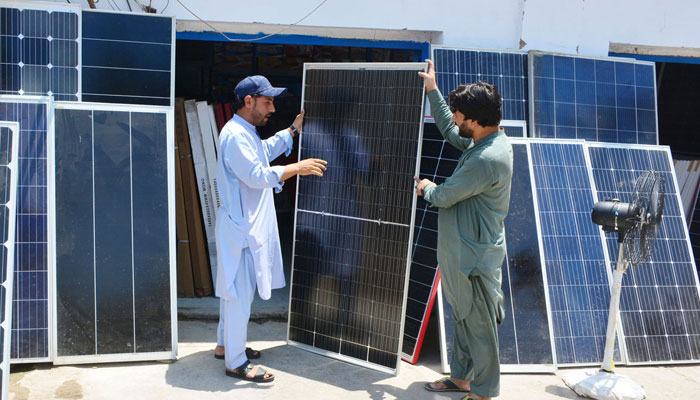Amid hike in power tariff by 155pc: Solar panels worth $2.1bn imported from China in last fiscal, says study
Study ‘The Great Solar Rush in Pakistan’ highlights Pakistan’s growing prominence in renewable energy landscape
ISLAMABAD: Pakistan imported around 15 GW solar panels worth $2.1 billion from China over the past fiscal year, a study titled ‘The Great Solar Rush in Pakistan’ revealed.
“Contributing to this transition is the increased electricity tariffs—up by 155 percent over three years—driving high consumption households and industries to shift toward solar energy solutions.”
In the past year, this has resulted in a 10.4 percent drop in grid electricity demand, with projections indicating further decline emphasizing the need for grid modernisation and revised demand forecasts to support decentralised energy generation.
In parallel, falling battery prices are also likely to boost solar adoption, making urgent grid adaptation essential for maintaining the financial viability of Pakistan’s utility model. Global and local analysts, during the study launch, here on Thursday attributed Pakistan’s rapid shift to solar as a unique, consumer-driven “solar rush” fueled by rising electricity costs, declining technology prices and strong import trends.
At the launch of the study titled ‘The Great Solar Rush in Pakistan’ by Renewables First explores this shift, highlighting Pakistan’s growing prominence in the renewable energy landscape of developing nations, analysts from different parts of the world in the energy transition through renewable means is quite commendable.
“Pakistan’s solarisation drive is indeed impressive but we have also seen these trends being replicated in other emerging markets,” said Jenny Chase, Solar analyst at Bloomberg NEF. What makes Pakistan unique is the rapid nature of these additions, she further emphasized.
It was noted that Pakistan’s market stands out globally, with 27 GW in imports since 2020 and significant growth across residential, industrial and agricultural sectors. On adapting the grid infrastructure to accommodate these imports, Syed Faizan Ali, member Prime Minister’s Solarisation Committee, said, “With strong policy alignment, we can harness this growth while addressing these operational challenges.”
Global experts emphasized the transformative impact of Pakistan’s decentralised, consumer-driven approach, identifying key trends and challenges shaping the future of renewables. “We’re witnessing a convergence of factors—rising electricity prices, falling renewable technology costs, and a supply surplus from China—fueling Pakistan’s solar adoption,” said Sohaib Malik, senior manager, Markets & Strategy, BayWa r.e.
Endorsing his thoughts, Dave Jones of Ember Energy stated that Pakistan’s model demonstrated how a booming solar market could offer a transformative path in places like South Africa, Brazil, and Nigeria, offering alternative for decentralised and people-led energy transitions.
“Pakistan is now the world’s 7th largest import market of Chinese solar panels with 17 GW imported only in 2024. The market’s full magnitude is yet to be quantified. Declining prices of solar and storage are shaping a dynamic landscape that could lead to greater off grid adoption,” Baldesh Singh, a Principal Analyst at S&P Global, said.
Danny Kennedy, a global cleantech entrepreneur said, “Pakistan’s shift is a consumer led model which is inspiring for other countries aiming to leapfrog to renewable energy. This decentralised energy movement, while coming with its own set of challenges, needs to be celebrated and adopted.”
There was a consensus amongst the experts that Pakistan’s people-led energy shift offers valuable insights for other developing nations, with future solar growth anticipated as battery prices are declining rapidly.
-
 Ghost's Tobias Forge Makes Big Announcement After Concluding 'Skeletour World' Tour
Ghost's Tobias Forge Makes Big Announcement After Concluding 'Skeletour World' Tour -
 Katherine Short Became Vocal ‘mental Illness’ Advocate Years Before Death
Katherine Short Became Vocal ‘mental Illness’ Advocate Years Before Death -
 SK Hynix Unveils $15 Billion Semiconductor Facility Investment Plan In South Korea
SK Hynix Unveils $15 Billion Semiconductor Facility Investment Plan In South Korea -
 Buckingham Palace Shares Major Update After Meghan Markle, Harry Arrived In Jordan
Buckingham Palace Shares Major Update After Meghan Markle, Harry Arrived In Jordan -
 Demi Lovato Claims Fans Make Mental Health Struggle Easier
Demi Lovato Claims Fans Make Mental Health Struggle Easier -
 King Hospitalized In Spain, Royal Family Confirms
King Hospitalized In Spain, Royal Family Confirms -
 Japan Launches AI Robot Monk To Offer Spiritual Guidance
Japan Launches AI Robot Monk To Offer Spiritual Guidance -
 Japan Plans Missile Deployment Near Taiwan By 2031 Amid Growing Regional Tensions
Japan Plans Missile Deployment Near Taiwan By 2031 Amid Growing Regional Tensions -
 Meghan Markle, Prince Harry Spark Reactions With Latest Announcement
Meghan Markle, Prince Harry Spark Reactions With Latest Announcement -
 Kate Hudson Reflects On Handling Award Season With No Expectations
Kate Hudson Reflects On Handling Award Season With No Expectations -
 6 Celebrities Who Have Been Vocal About Anxiety And 'panic Attacks'
6 Celebrities Who Have Been Vocal About Anxiety And 'panic Attacks' -
 Is This The Future Of Train Travel? Robot Dogs, Drones Are Redefining Public Transit Safety Through China’s New Metro Station Deployment
Is This The Future Of Train Travel? Robot Dogs, Drones Are Redefining Public Transit Safety Through China’s New Metro Station Deployment -
 Sarah Ferguson Seeks Hollywood Backing As Epstein Files Resurface
Sarah Ferguson Seeks Hollywood Backing As Epstein Files Resurface -
 China’s AI Milestone: ByteDance’s Doubao Chatbot Hits 100M Users During Lunar New Year
China’s AI Milestone: ByteDance’s Doubao Chatbot Hits 100M Users During Lunar New Year -
 Think You Know ChatGPT? Here Are 5 AI Levels You’ve Never Seen
Think You Know ChatGPT? Here Are 5 AI Levels You’ve Never Seen -
 Bitcoin Bounces From $62,000 As On-chain Metrics Signal Prolonged Weakness: Here Is Everything To Know
Bitcoin Bounces From $62,000 As On-chain Metrics Signal Prolonged Weakness: Here Is Everything To Know




